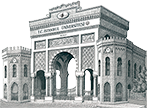Prof. Dr. Suat ÖZKORUCUKLU - Head of Department
Physics is a basic science that examines the relationship between matter and energy, which can be investigated experimentally, measurable and defined mathematically, depending on general or temporary laws, apart from changes in the chemical structure of matter.
Our physics department started its education life under the roof of Istanbul University, which was established within the scope of the University Reform based on the law numbered 2252 in 1933.
Starting from the 2020-2021 academic year, our Physics Undergraduate Program is conducted over two different curricula, 100% Turkish and 100% English. In the first two years, our students who choose our department take basic courses such as physics, mathematics and chemistry, as well as basic information technologies, computer programming and electronics courses. In the third year our students take theoretical mechanics, electromagnetic theory, quantum physics, atomic/molecule physics and thermodynamics courses. They complete their curriculum by taking nuclear, solid-state, particle physics courses as well as many elective courses and courses offered on topics of interest in the last year.
In our depertment we have six divisions as, Atomic and Molecular Physics Division, General Physics, Solid State Physics, Mathematical Physics, Nuclear Physics and High Energy/Plasma Physics. Our department continues its research activities with many collaborations nationally (TUBITAK, TENMAK (TAEK), MAM, and many national universities) and internationally (CERN, GSI, DESY, FNAL, foreign universities).
We perform theroretical studies as well as research acitivites in our Atomic and Molecular Physics Chemistry, Environmental Radioactivity Measurement and Research, Dielectric Spectroscopy, Sustainable Energy Research, Advanced Lithographic Methods, Thin Films and Defect Characterization, Infrared Spectroscopy and Simulation, Laser Spectroscopy, Molecular Simulation, Molecular Spectroscopy, Nano and Optoelectronic Research, Nanotechnology Research, Dedector Design, Gamma Spectroscopy, Radon Measurement, Environmental Radioactivity Measurement and Research, Particle and Radiation Dedectors Research and Development, Renewable Energy and Oxcide Hybrid Systems, High Magnetic Field and Low Temperature Laboratories.
Our students, who are successful in the Master's and Doctorate admission exams held twice a year, can conduct research that adapts and contributes to the changing and developing world, with the priority of our country's needs, within the framework of the opportunities we have.

